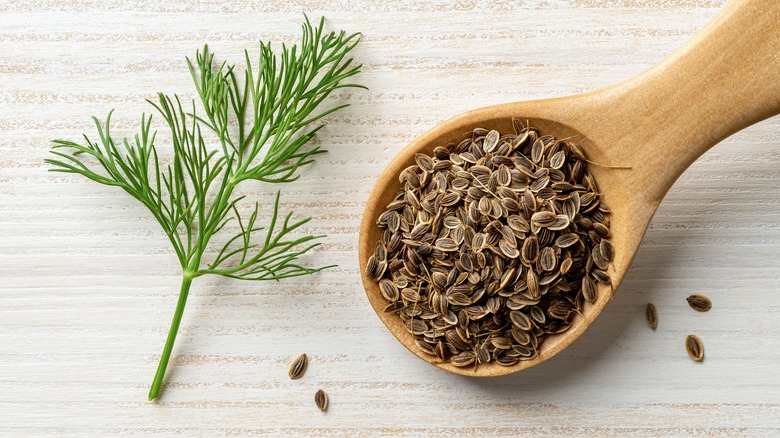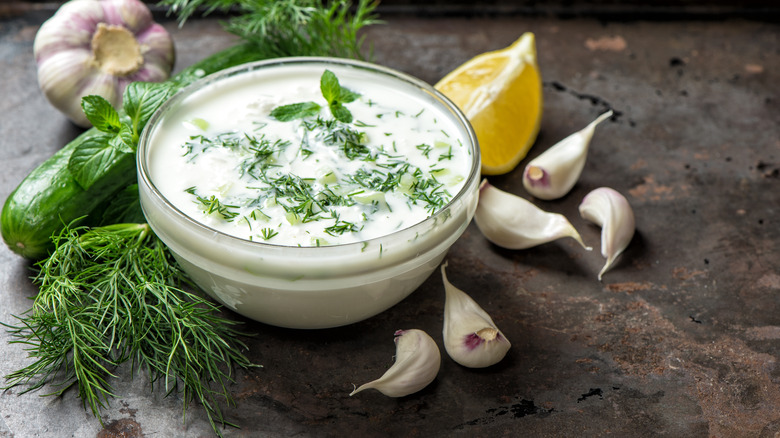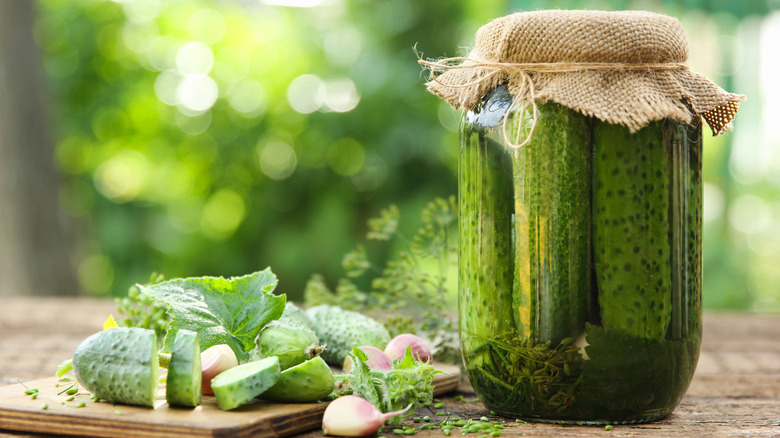When It's Best To Cook With Dill Weed Vs. Seeds
Dill (Anethum graveolens) is both a spice and an herb depending upon which component of the plant is used, equal to cilantro/coriander and fennel. The frilly green leaves and the seeds, which come from the spent flower heads, contribute the distinct tang, freshness, and aroma to many dishes. (The genus name translates from Greek, meaning strong smelling.) However, they're not interchangeable. The foliage tastes bright and grassy — it lemony, whereas the seeds are pungent and earthy. A few preparations can utilize them simultaneously, for example, soups, pickles, and roasted or grilled meats. The seeds are added at the beginning of cooking, either whole or crushed, and sometimes toasted; and the feathery tops can be sprinkled over or stirred through the finished dish. Yet, since their applications differ so widely, most recipes and techniques call for one or the other.
Some people are averse to anything dill, and it's a flavor that doesn't abide being mistaken or disguised. It's included for its particular dilly-ness and some notable dishes wouldn't be the same without it, such as refreshing tzatziki and boiled and buttered potatoes. Likewise, salmon and cucumbers seem practically invented for it. But you'll want to make sure you're using the correct version of dill for the above dishes and others so that its unique taste can be enjoyed.
Dill weed
Dill weed is easily found at the grocery store throughout the year, available even to add vitality to winter dishes. Yet you'll be most likely to get your money's worth when acquiring it from a farmer's market or your own garden. Consuming dill immediately following harvest ensures the best flavor because it dissipates quickly once picked. Culinary Physics explains that oil glands in or on the leaves house flavor molecules that once crushed or cut release aromas and flavor compounds. The soft leaves of dill lose these important compounds rapidly. For stronger seasoning, chop leaves finely, or to preserve the taste, dry them thoroughly and use a sharp knife.
These same taste-making oils diminish with heat, therefore cold salads and dips are perfect dishes for highlighting dill's grassiness. It's a staple herb for dairy-based sauces and recipes featuring eggs and mayonnaise, since its flavor acts as a foil to heavy or fatty ingredients. On the other hand, when added just before serving, it's a match for delicate soups, fish, and grilled meats, with a taste that embodies the ease and ripeness of summertime eating. We can prolong garden fresh dill's availability and that sensation with some help from the freezer. Preserve chopped dill weed in ice cube trays or store washed and dried whole sprigs in an airtight container for up to four months.
Dill seeds
According to the National Library of Medicine, dill seeds are actually not seeds at all, but tiny dry fruits (known as schizocarps) split into intact sections called mericarps. They can of course be purchased bottled or nearly ripened seeds can be harvested from the flower stalks and allowed to dry before use. Once properly dried, they'll keep for up to six months. Their flavor profile is compared to caraway, celery, and anise seeds, and less potent dill weed; some say they are slightly bitter.
The seeds' enclosed presentation requires them to be cooked for a while before they'll flavor a stew, soup, or roast, unlike dill weed. If introduced early, their contribution will be rounded and mild; add them later to retain more bite. A nice approach is to layer seeds with a sprinkling of dill weed at the end of the dish. Jarred dill pickles are a classic use for the seeds; the heating and subsequent storage in brine allow them plenty of time to contribute their savory essence. Slow simmering, marinating, and braising are also good techniques. And they can be incorporated into raw salads for an astringent pop; according to Serious Eats, they don't need to be ground to be edible, though they can be. They'll absorb sufficient liquid to soften for comfortable eating. Like other seeds and spices, give them a toast for extra flavor. Lastly, after noshing on delicious dill-spiked dishes, chew some plain seeds for fresh breath.


